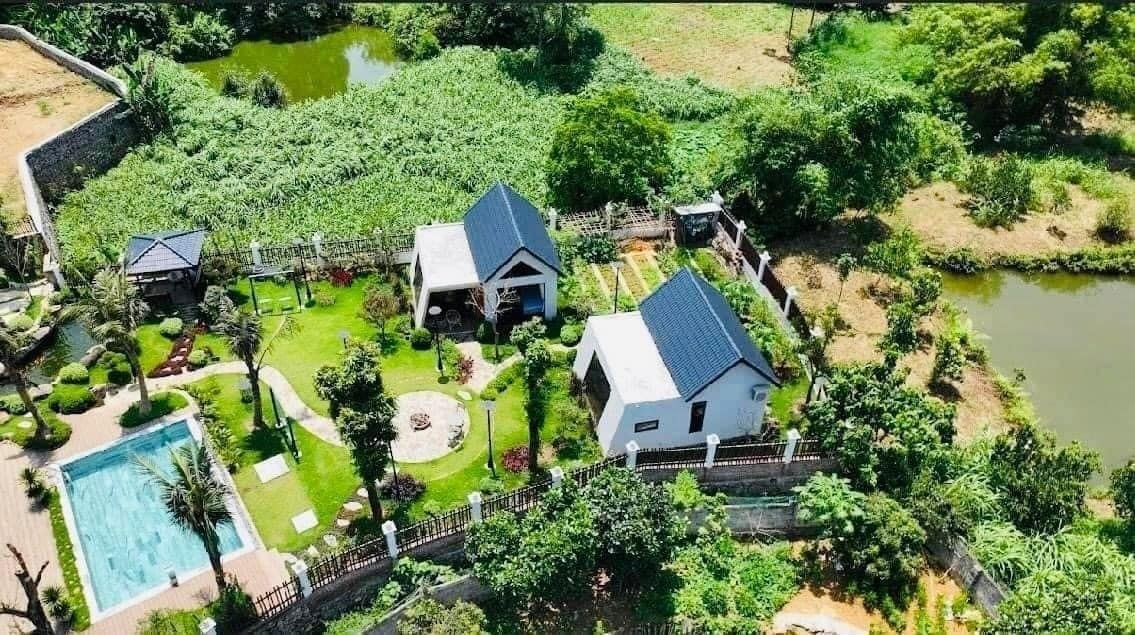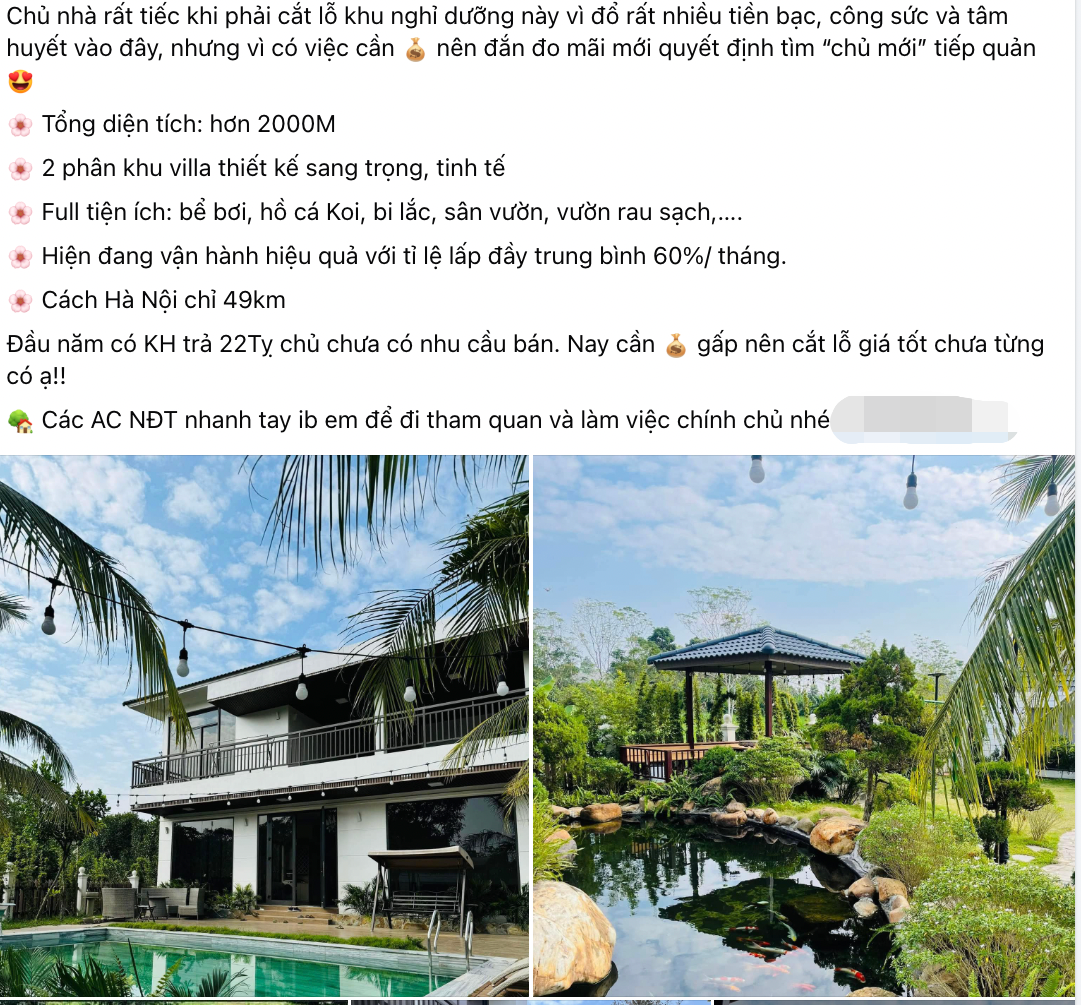After a period of "hot" growth, the Hanoi homestay model fell into a gloomy business situation, investors suffered increasingly heavy losses so they had to rush to sell.

Sell at a loss to escape
For many months now, Mr. Nguyen Ngoc Van (Hanoi) has been continuously posting ads for a homestay area of over 1 hectare in Soc Son on many information channels. Mr. Van's land has over 400 square meters of residential land, which he bought for nearly 8 billion VND.
At the end of 2022, his family invested nearly 5 billion VND more to build a homestay area with more than 3 villas and 1 spacious and comfortable community house with the hope of developing a resort tourism business model, both using a large land fund and having more work and income for the whole family.
However, running a homestay business is not simple. When operating, his family realized that there were too many problems and costs, especially finding tenants was very difficult.
According to Mr. Van, his homestay area is only crowded with guests for about 3 months in the summer, the rest of the year is very sparse, many weekends only rent out 1 or 2 villa rooms, sometimes there are no guests at all.
With no income and having to borrow a lot of money to invest, with heavy interest, Mr. Van and his wife had to sell the homestay to recover their capital. However, although the selling price has been reduced many times, there are still no buyers. The number of people asking is not much, because the value of the land is not small, and the homestay business at this stage is no longer as "prosperous" as before.
"If many years ago, homestays flourished as a new trend in the real estate business, now this model has become saturated and even loss-making," Mr. Van said sadly.
Ms. Nguyen Hong Nhung, a homestay investor for many years, said that the homestay market "collapsed" partly because many people rushed to invest following the previous trend without anticipating the bottom of real estate from mid-2022 until now.
"Most of the friends I met later in the homestay business were amateurs, following the trend when the market heated up three years ago. However, when developing massively, the sudden increase in supply will lead to surplus, causing many homestays to fall into a state of empty guests and losing business. Many homestay investors today, some are trying to operate at a low level, but the majority are mainly looking for ways to sell off," said Ms. Nhung.
According to Mr. Nguyen Tuan - a real estate broker in Hanoi - currently many investors are having to reduce the resale price of homestay areas due to unfavorable business.
For example, a homestay in Ba Vi has been operating for 4 years. During peak season, the average revenue is about 50 million VND/month, but in winter, the revenue drops to 15 - 20 million VND/month. Initially, the owner advertised for sale at 12 billion VND, but due to urgent need for money, he reduced the price by 1 billion VND to make it easier to find a buyer.
Even in Yen Bai commune (Ba Vi district), there is a 5,000 m2 plot of land for sale at 38 billion VND. However, after 1 year of selling, the owner still could not find a buyer, so he reduced the price by 10 billion VND, cutting the loss to 28 billion VND.
Or a homestay area in Luong Son (Hoa Binh), with a scale of 6,000 m2, including 400 m2 of residential land, is also being sold for more than 15 billion VND. A real estate broker said that this figure is only 70% of the initial investment value of the homestay business owner.
According to Mr. Tuan, small-scale homestays priced around 3 billion VND have higher liquidity and are easier to close. However, some homestays with a scale of up to tens of billions of VND have very few interested buyers.
In addition, most of the homeowners are in urgent need of selling, accepting deep discounts due to financial pressure. At the same time, some homestays are located in remote, deserted locations, so there are few tenants, leading to no income. Accordingly, they all want to sell as quickly as possible, with prices reduced by 30-40% compared to the investment amount.
It was predicted
Dr. Nguyen Tri Hieu, an economic expert, shared that before the Covid-19 pandemic, it was still a golden time to invest in homestays, but after Covid-19, when operating costs increased and demand for vacations gradually decreased, many investors were forced to withdraw, leading to downward pressure on prices.

At the beginning of 2023, the resort farm market plummeted, liquidity was low, and the economic situation was difficult, so many investors had to sell to recover cash flow, but so far they have not been able to find buyers, even though they have accepted deep discounts.
In the coming time, Mr. Hieu said that the homestay business model is expected to be strongly screened. To optimize the benefits when investing in this segment, investors need to carefully consider the location, infrastructure, and actual exploitation capacity of the real estate. At the same time, carefully researching the market and building a sustainable financial plan are also factors that cannot be ignored.
Sharing the same view, Mr. Nguyen Van Dinh, Chairman of the Vietnam Real Estate Brokers Association, said that real estate associated with tourism and resorts is a segment with demand, but widespread investment without calculation has caused a "breakdown" and investors fleeing the market. This situation was predicted three or four years ago when a wave of investors poured money into the suburbs, causing the market to "heat up".
According to Mr. Dinh, resort investment requires high professionalism, requiring knowledge of cash flow management, investment performance, operations, and customer care services. In fact, many people have the mentality of "just buying a piece of land and building a house for rent and that's it", ignoring the need to carefully research the market.
"This has led to a situation where in many suburban areas, more than half of villages and communes are building homestays and resorts, while the number of tourists is small. With business losses, many investors are forced to reduce prices to get rid of their goods," said Mr. Dinh.
TH (according to VTC News)